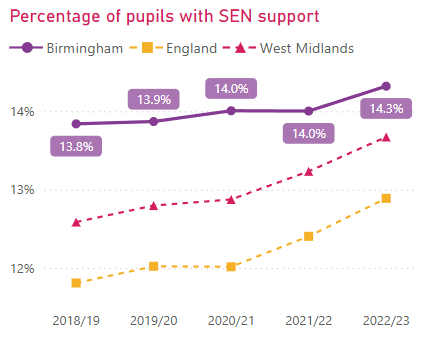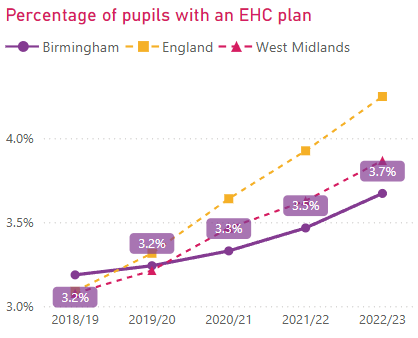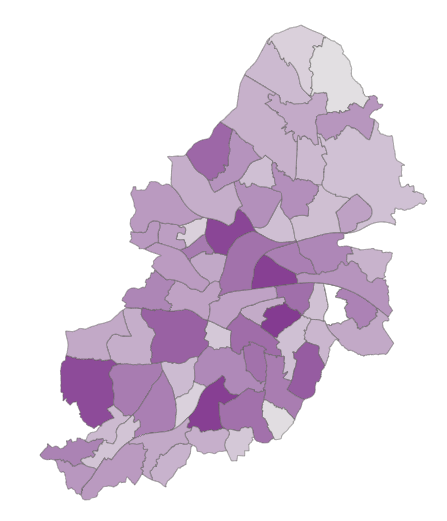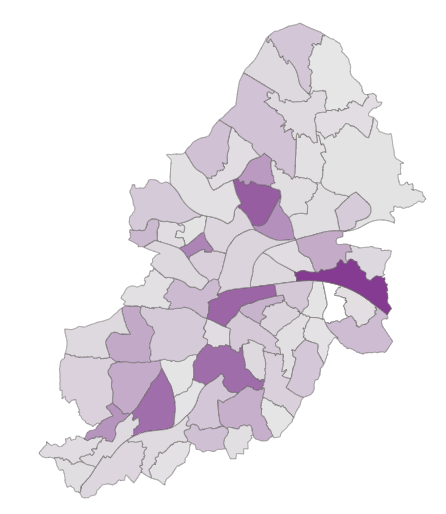Birmingham SEND Briefing Book
We are pleased to introduce the Birmingham Special Educational Needs and Disabilities (SEND) briefing book – our first step in publishing data and analysis relating to children and young people with SEND in the form of an interactive dashboard.
Birmingham City Council, in collaboration with Birmingham Children’s Trust, Birmingham Children and Young People’s Partnership, the NHS and Birmingham Parent Carer Forum, have actively been working to improve SEND services in Birmingham. Following two Ofsted and CQC inspection outcomes in 2018 and 2021, a written statement of action was issued and the Department for Education (DfE) appointment of John Coughlan as SEND commissioner for October 2021.
The SEND Improvement Programme sets out how Birmingham City Council will improve upon the SEND services they provide and improve the outcomes for the children and young people of Birmingham. Along with this, the SEND Strategy 2023 – 2028 sets out some of the most important issues facing SEND children and young people; our priorities and outcomes SEND children and young people need to thrive in Birmingham; and how we will work in partnership.
The briefing book aims to provide an overview of those who are 0 to 25 years olds with SEND in Birmingham. It highlights areas of need to help inform the ways in which to best support and understand our SEND cohort (All SEND, SEN Support or those on an Education Health Care (EHC) Plan). It also allows for potential understanding of demand on services to provide the appropriate provisions and ensure that support and interventions are targeted towards certain demographics of people and places where they are needed most.
The data used in the briefing book is based on DfE academic year School Census data from the Spring term in 2023 and will be updated annually as data become available. The data relates to pupils attending Birmingham schools so will not include Birmingham Children and Young People with SEND attending a school or setting in another Local Authority.
Examples of data and insights found in the SEND Briefing Book’
The interactive briefing book allows you to explore the SEND cohort in relation to Prevalence and Characteristics; Early Years; Education Outcomes; Destination Post-16; Preparation for Adulthood and Education Governance. Where possible, comparisons have been drawn between Birmingham and the England average, as well as its statistical neighbours. This is to better contextualise the data and highlight areas of greatest need and improvement that are specific to Birmingham. For example, it identifies trends such as:
In 2022/23, a total of 30,432 pupils were recognised to be receiving SEN Support.
In proportion to the school census population, this equates to 14.3% of pupils receiving SEN Support which is in line with previous years trend and remains above both the England (12.9%) and West Midlands (13.7%) average for 2022/23 academic year.

In relation to pupils on an EHC Plan, a total of 8,212 of the school pupil population were on an EHC Plan. This equates to 3.7% of the school census pupil population.
The percentage of pupils with EHC plans in Birmingham continues to increase from 2018/19, however, the rise in those on an EHC plan in Birmingham (from 3.2% in 2018/19 to 3.7% in 2022/23) is far less drastic than the England average (from 3.1% in 2018/19 to 4.7% in 2022/23 academic year

The top three primary needs with the largest increases from 2018/19 to 2022/23 academic years across the SEND cohort are:
SEN Support:
- Speech, Language and Communication needs, up 0.9% (from 2.9% in 2018/19 to 3.8% in 2022/23).
- Multi-Sensory Impairment, up 0.5% (from 13.8% in 2018/19 to 14.3% in 2022/23).
- Social, Emotional and Mental Health, up 0.4% (from 2.0% in 2018/19 to 2.4% in 2022/23).
EHC Plans:
- Autistic Spectrum Disorder, up 0.5% (from 1.1% in 2018/19 to 1.6% in 2022/23).
- Speech, Language and Communication needs, up 0.1% (from 0.3% in 2018/19 to 0.4% in 2022/23)
- Specific Learning Difficulty, up 0.03% (from 0.05% in 2018/19 to 0.08% in 2022/23).
When looking at gender, there is a higher proportion of boys with SEND than girls overall. Breakdown by primary need identifies there are two thirds more boys with Autism Spectrum Disorder than girls, and twice as more boys with Social, Emotional and Mental Health needs than girls. The same applies for Speech, Language and Communication needs.
With regards to ethnicity of pupils, the largest SEND school population in Birmingham is of White British ethnicity with 12,425 pupils. Followed by Pakistani (8,637 pupils) and Black African (2,583 pupils).
In relation to area, there is a higher concentration of pupils with SEN Support attending school settings in Small Heath (991), Brandwood and King’s Heath (964), Alum Rock (962), Aston (929) and Bartley Green (902). For those with an Education Health Care Plan, the concentration of pupils attending school settings are in Glebe Farm & Tile Cross (621), Stockland Green (500), Bordesley Green & Highgate (469), Moseley (445) and Bournville & Cotteridge (440).


Map of SEN Support in Birmingham
Map of EHCP’s in Birmingham
When looking at education, the gap in attainment for Birmingham pupils with SEND is much smaller at Key Stage 4 than Key Stage 2 when compared to the England average.
| SEND Cohort | Key Stage 2 Attainment | Key Stage 4 Attainment | ||||
|---|---|---|---|---|---|---|
| Birmingham | England | Gap | Birmingham | England | Gap | |
| SEN Support | 22.0 | 24.0 | -2.0 | 32.7 | 33.2 | -0.5 |
| EHC Plans | 5.0 | 8.0 | -3.0 | 11.1 | 14.0 | -2.9 |
The rate of progress made from the end of Key Stage 2 to Key Stage 4, informs, Birmingham pupils with SEND made more progress than the England average SEND pupils. In 2022/23 academic year, Birmingham pupils on SEN Support received an average progress 8 score -0.35, which was 0.10 above the England average score of -0.45. For those on an EHC Plan, the average progress 8 score stood at -1.02. This was also a 0.10 above the England average score of -1.12.
Destinations post 16, indicates 4,671 pupils identified with SEN or a Learning Difficulties and Disabilities went into further education. Followed by 628 pupils undertaking Training or Apprenticeship and 96 were Employed.
By the age of 19, 38.0% of SEN Support pupils achieved a Level 3 qualification (equivalent to an A Level or access to higher education diploma) and is 1.3% above the England average. For those on EHC Plans, 10.3% achieved a Level 3 qualification, 3.6% below the England average.
To gain a richer understanding of the SEND cohort, we urge you to explore the SEND briefing book (our interactive dashboard) which has been commissioned by the Children’s Partnership Board and developed in partnership with the Children’s and Families directorate and Insight, Policy and Strategy (IPS) team.
We aspire to continue to develop and update this briefing book to help further understand the Birmingham SEND cohort through the lens of a whole system approach, drawing upon wider partner and service level data to provide a more detailed and geographical breakdown of the Birmingham SEND cohort. As we do, we will provide further updated briefings.
We hope this work will help support evidence-led decision making within the sphere of SEND provision in Birmingham. Please don’t hesitate to share it, and please contact us at [email protected] if you can see improvements or changes that would help increase its impact.
For more data on Birmingham, please visit the Birmingham City Observatory
Authors:
Sue Harrison, Strategic Director of Children & Families,
Helen Ellis, Director of SEND and Inclusion

